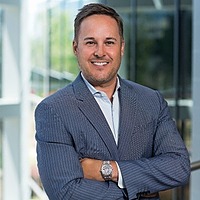 As part of the Meet the Controller/CFO series, the Controllers Council recently interviewed John Bozin, CFO Advisor at Armanino, Strategic Finance Outsourcing or CSFO and CFOO, the combination of CFO and COO, or operating CFO is another way that John has told me that it’s coined for certain sizes and types of organizations. Prior roles for John included Chief Finance and Administrative Officer, COO and Deputy Executive Director, and CEO in a variety of sectors along with numerous boards of directors
As part of the Meet the Controller/CFO series, the Controllers Council recently interviewed John Bozin, CFO Advisor at Armanino, Strategic Finance Outsourcing or CSFO and CFOO, the combination of CFO and COO, or operating CFO is another way that John has told me that it’s coined for certain sizes and types of organizations. Prior roles for John included Chief Finance and Administrative Officer, COO and Deputy Executive Director, and CEO in a variety of sectors along with numerous boards of directors
Following are questions from moderator Neil Brown, and answers from John Bozin. If you are interested in learning more, view the full interview video archive here.
Q: What inspired you to pursue a career in corporate finance?
A: Well, as a child and really through my high school years, my dad had a pretty good number of friends that were leading and managing large successful businesses and kind of looked at those traits and my father was a high-level officer in the military, and I just really watched him manage staff and really be really in a CEO type position. And so, I always really gravitated and wanted to be a CEO, and moreso of a meaningful organization, directing strategy, improving business in ways that either deliver products and services, but also being able to be CEO that can deliver on quality, but also on price and value.
And having always discussed and been around those types of individuals, one of the things that they had always told me is that they had really gone through the ranks. They had really sharp pencils and they were CFOs, and they really went the CFO route, then the stepping stone with the COO and the CEO. And so being a CEO that is really well versed in all of the executive disciplines, and I wanted to make sure that I was known for having an extremely, again, sharp pencil, and a background that was just proven as a CFO is that if I get into the leadership role or in meeting or in executive sessions, that I could really partner with the CFO and I could speak that part of the business, because I always thought that that was half of what a CEO did. You had to really know the numbers, but then you’d have to be able to really take it to the next level.
So, when I really began my career early in the 1990s, the only way to become a CEO was through that journey, from the CFO role to the COO, and then into the CEO position. And I think it’s quite a forgotten path and one in which I believe is partly why the CFOO role is becoming ever so important. We’re seeing CEOs with very limited executive experience; you see little to no financial acumen and often only technical or creative experience. We’re seeing people come out of technology roles, out of creative and marketing, really driving revenue growth and driving customer list, but they’re not really managing the back office or the business.
And I think there’s not enough sense of profitability, managing expenses. And one of the things that I learned early in my career, and probably in the mid ’90s too, is that there’s a lot of ways to grow business. And you’ll see unsuccessful CEOs and CFOs trying to grow that revenue base and instead growing liability at the same rate, growing expenses. And next thing you know, you’ve got 5,000 employees, a ton of liability and profitability and margins haven’t expanded so I had a lot of early experience of some strong CFOs and CEOs saying, “Look, we need to focus on margin, profitability, and revenue growth will happen,” but it’ll happen organically and in the right way.
So, I think again, as a result, I think I wanted to make sure that I was what I call two sides of one coin. And one side of that coin being a financial expert, and no one can really challenge me that I didn’t know the financial statements, I didn’t really know the inner workings of the business. And then the other side of that coin is being an operator, having strong leadership skills. And so with that goal, my journey to the CFO office as an important basis of my professional, my career began in that way. So I really started in gaining experience in finance, accounting, junior level positions all the way up to the office of the CFO.
Q: Tell us a little bit then about the roles and responsibilities of a CFOO and how do they differ from a CFO only or a COO only?
A: I think the first piece of it really is that to the key financial operating officer is first and foremost the CFO of the business, leading the entirety of the office of the DFO. And much to what my previous question answer was that you got to be able to step from the DFO, those, the rudimentary, fundamental concepts, the finance, and accounting. And those give you the tool sets to I think, make effective operating decisions and then also into leadership. So again, I think you’re managing and leading the entirety of the office of the CFO and fundamentally in charge of the company’s financial health, that’s the first piece you got to get to, right?
And then the operations portion really encompasses the administrative, the back-office processes, and in some instances, some front office responsibilities. You’ll see occasionally, you’ll see some type of chief financial administrative officer or CFOO kind of dabble in some front office work, which often will include technology, sometimes marketing, but the chief finance and operating officer I think develops plans to improve a company’s financial outlook so that’s the CFO piece. Then I think while also supervising different departments as they implement those plans, that’s the operator hat. They take charges of financial processes such as portfolio management. They can weave in some administrative procedures such as ensuring compliance with government regulations, just sort of as an example. I think the chief finance and operating officer though, usually supervises several departments. Like I said, from accounting to information technology and even human resources.
The easiest way I think to define the CFOO though, is that they are the financial head of the organization, but that they have unique skills and talents to show up as a leader, having broad oversight and moving beyond singular tasks to navigate the business cohesively around financial and business performance. To be successful in the CFOO role, I think you’ve got to be able to blend that traditional, like you were saying earlier, that CFO traditional roles and then the COO skills and attributes.
Q: Is it industry specific? Is it company size? I mean, clearly a Fortune 500 Global 1000 might have separate positions. Maybe is it a mid-size business that’s more likely to have a CFOO?
A: I think it’s the type of business. So, I was a division CFO for Fortune 100 company, we had a chief accounting officer, we had a CFO. You’ve got all these variety of C-level positions. I think it’s the type of business and I also believe it, and I can give an example of that. So, SaaS based company is probably a great opportunity because those SaaS metrics, those SaaS financial data and those KPI, they’re so weaved into the finances that really move the business, and I also think a lot of it too has to do with the type of CEO you have. The type of CEO that probably was a CFO at one point says, “You know what? I’m a traditional CEO. I’m somebody who’s again, maybe two sides of the coin and I am going to drive this business around the numbers. I’m going to drive this business around financial performance.”
If you have one of those CEOs, I think there’s a likelihood that the CFO, COO roles could possibly be morphed. Or when I worked in New York Health and hospitals, the CFOO role was created and we also had a COO role, but the COO was more front facing, front office facing. And as a CFOO, I was all the back office and the financial operations, so I think it’s kind of two types of situations. But I do believe, or I can see your question there, these much larger Fortune 500 type entities, the CFOO’s not a realistic, it’s too large of a role. Too many hats, too many duties and you wouldn’t be able to divide and conquer appropriately.
Q: What have been the most significant keys to your success?
A: I’ll say really a significant key to my success has been to not really think of myself as a CFO, but really just as a leader with the financial expertise that, he also really taught me, he said, “You want to make others sort of extensions of your role.” And so you go into an organization, you look across organization, you want to make a thousand other little mini-CFOs, you want to get people to act and think like the office of the CFO. And you do that through leadership, you do that through influence.
And so one of the things is a lot really not letting my peers or others think of me in any limited box, just as a CFO and taking on opportunities to contribute beyond the traditional roles of the CFO, raising your hand for projects and just making sure you come to meetings and just you really engage in your business and particularly where you’re in settings with others to not just walk in with your CFO app, but just really be a leader. Come in there and contribute at every way you can and not just from a financial perspective and prove that the role is not limited to financial and data aggregation, but that those components are truly, they’re just the backbone of that role.
Q: What advice would you give to others that seek a CFO or CFOO career?
A: Well, I have two, I guess I’ll give you two answers on this. I think the first one is you can’t stay within the margins. If you’re someone who’s staying within the margins, I don’t even think you’re a CFO today, those days are removed by 20 years. If you’re sitting behind a desk counting and being, you’re not a CFO, you’ve got to… At the same time though, you don’t want to be a maverick, you don’t want to go outside the margins in any maverick way, but it’s about being inquisitive. You must have a desire for learning new concepts. Again, also it’s about dialogue. Dialogue, dialogue, dialogue, and then ask more questions and then make it a habit to never eat lunch alone. I mean, you just don’t want to. Every opportunity you must eat lunch, why not invite someone where you can have dialogue and you can learn? If you don’t have someone to meet up for lunch, eat lunch while you’re watching a LinkedIn learning or reading a book.
But a lot of those things don’t need to be around your specialty. As a CFO though, you need to stay on top of the trade. You need stay on top of your, make sure your pencil stay sharp, your knife is sharp, but don’t sit behind a desk again. Leverage the power of the staff and the experts within your entire organization and learn from them. Once a week, try to have lunch with someone and get to know them and what’s driving them, what’s new in their business, and what new concepts do they do, have they learned? And that’s going to make you such a sharp CFO. And if you’re in a role with CFOO, it’s going to make you even sharper.
And those connection points are what are going to get projects and initiatives to hit the bottom line. So, harness that information, weave it into the traditional CFO data streams and you’ll find that you’re one step closer to becoming a CFOO and say most importantly, you’ll find that you’re already a leader most likely and you just didn’t even know it. And that people have been watching you and waiting for you to lead them. But I’ll lead back to another point I made is my most important piece of advice that previously mentioned from now to 2028, the CFOO career is expected to grow 16% and produce about 105,000 job opportunities across the United States. If you want to become a CFOO, the opportunity’s waiting for you. You got to go seize your moment. And so, you got to wake up tomorrow and you’ll be one of the 105,000 people with that job opportunity to lead organizations and take them to the future.
To learn more, view the full interview here.




